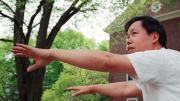After rolling around on the floor for a play’s fight scene, Jessamyn Conrad ’00 was covered in bruises. They were purple and painful: “the kind you get that’s like an egg under your skin,” she recalls. Her friend Andy Green ’99, A.M. ’03, had a solution. For years, he’d taken tai chi lessons from Master Yon G. Lee, an Adams House affiliate and the senior adviser and chief instructor of Harvard’s Tai Chi Tiger Crane Club. An expert in kung fu, tai chi, and chi kung, Lee had a reputation not just as an expert martial artist and teacher, but also as a healer, Green explained. “He would rub bruises with his chi, so to speak, and make them go away.”
“And so Master Lee came up to me at the milk machine or something and said, ‘I’ll take care of it,’” Conrad recalls. Lee firmly massaged her bruises for about 20 minutes; when he finished, two were faint red marks and one was gone. “I didn’t think that was physically possible,” Conrad recalls thinking. “And ever since, I listened to Master Lee.”
Those interviewed who have encountered Lee in his more than three decades at Harvard almost invariably report being left with a similar sense of awe. Whether he’s teaching tai chi in the Malkin Athletic Center (MAC), at Adams House, or in Harvard Yard, he’s known for graceful, effortless movements and unwavering attention to those around him. “He walks with gentle strength,” says Harvard University Police Department sergeant Kevin P. Bryant—a minister and a ninth dan in kendo. “He’s like an iceberg. There’s a little on the top and there’s a lot on the bottom.”
A brief interaction with Lee often develops into a decades-long relationship. Green first met Lee when he took a tai chi class his sophomore year, hoping the practice might help him manage the stress and asthma complications he dealt with as a freshman. Immediately, he felt himself drawn in by Lee’s warmth and knowledge. “You don’t even realize it, but you’re being transformed,” he explains. “You’re learning how to be grounded. You’re learning how to understand the physics of your movements.” By senior year, he was president of the tai chi club and helped Lee organize conferences on the medical study of the martial art. In 2006, when Lee led a group of students on a visit to China’s Shaolin Temple, a trip supported by the Shaolin Cultural Foundation, Green met them there. “I’ve lived in China for a couple years, I’ve lived in San Francisco,” he says. “I’ve taken classes from people who are quite good, and he is a cut above. His grounding, his ability to move people—just the form that he takes. It’s elegant, artistic.”
In every realm of his life, Lee has served as a sort of bridge. Equipped with a master’s degree in physics from Northeastern, he teaches not just tai chi technique, but the underlying physics behind each move. He has seen the benefits students derive from tai chi and has participated in medical studies to investigate how it could help the elderly improve their balance. As the liaison to the Asian community in Boston under two mayoral administrations, he helped incorporate Asian Americans into the political fabric. He has guided Harvard students through China and introduced Chinese philosophy and cultural teachings to Harvard students, faculty, and staff. Sean Palfrey, co-faculty dean of Adams House, always makes sure to have tea in stock, in case Master Lee shows up unannounced—as he is known to do—with 10 tai chi masters, all formally dressed in saffron robes.
Master Lee has spent less time at Harvard in recent years, dealing with the physical effects of Parkinson’s disease. He has spent his life teaching his students the healing powers of chi kung. Now it’s his students’ turn to help him.
“He’s one of our best friends,” Palfrey says. “We’re very grateful to him.”









